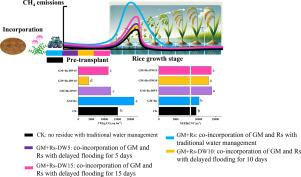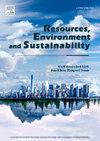水稻插秧前适当延迟灌溉可增加冬季绿肥-水稻轮作系统的生态系统净经济效益
IF 7.8
Q1 ENVIRONMENTAL SCIENCES
引用次数: 0
摘要
在中国南方,冬季绿肥与水稻秸秆共生已被证明是一种实用且经济可行的策略,可提高稻田土壤固碳能力和农业生产力。然而,如何控制水稻田中由于大量有机物的加入而导致的温室气体(GHG)排放仍然是一个瓶颈问题。我们进行了一项为期两年的田间试验,其中包括五种处理:无残留(CK)和绿肥与稻草共混的常规水管理(GM+Rs)、绿肥与稻草共混后 5、10 和 15 天的延迟淹水(GM+Rs-DW5、GM+Rs-DW10 和 GM+Rs-DW15),然后再插秧。与 GM+Rs 相比,延迟淹水处理使两年的平均甲烷排放量减少了 40.9%-60.8%。延迟淹水抑制了甲烷菌的生长和 CH4 的排放,这与地表水中溶解有机碳(DOC)浓度的降低有关。GM+Rs-DW10 处理的碳足迹(4.05 吨二氧化碳当量/公顷-1)和按产量计算的碳足迹(0.6 千克二氧化碳当量/千克-1)最低,甚至低于 CK 处理(15.11 吨二氧化碳当量/公顷-1 和 2.1 千克二氧化碳当量/千克-1)。此外,与 CK 和 GM+Rs 相比,GM+Rs-DW10 处理在两年时间内的生态系统经济净效益(NEEB)分别增加了 3750 和 2870 元人民币/公顷。总之,延迟淹水与绿肥和稻草的结合有利于实现高净生态经济效益和低温室气体排放风险。这一发现为生态高效水稻生产提供了重要而新颖的见解。本文章由计算机程序翻译,如有差异,请以英文原文为准。

Appropriately delayed flooding before rice transplanting increases net ecosystem economic benefit in the winter green manure-rice rotation system
In southern China, co-incorporating winter green manure and rice straw has proven to be a practical and economically viable strategy that enhances soil carbon (C) sequestration and agricultural productivity in rice paddies. However, the issue of how to control the greenhouse gas (GHG) emissions in paddy fields owing to the incorporation of substantial organic matter remains a bottleneck. A 2-year field experiment was conducted, which included five treatments: conventional water management with no residue (CK) and with co-incorporation of green manure and rice straw (GM+Rs), delayed flooding by 5, 10, and 15 days after the co-incorporation of green manure and rice straw (GM+Rs-DW5, GM+Rs-DW10, and GM+Rs-DW15) before transplanting rice seedlings. The delayed flooding treatments reduced the 2-year average CH4 emissions by 40.9%–60.8% compared with GM+Rs. The delayed flooding inhibited the growth of methanogens and CH4 emissions, which was linked to a reduction of dissolved organic carbon (DOC) concentration in surface water. The lowest C footprint (4.05 t CO2-eq ha−1) as well as the yield-scaled C footprint (0.6 kg CO2-eq kg−1) were observed in the GM+Rs-DW10 treatment, both even lower than those in CK (15.11 t CO2-eq ha and 2.1 kg CO2-eq kg−1). Moreover, the GM+Rs-DW10 treatment led to an increase in net ecosystem economic benefit (NEEB) of 3750 and 2870 CNY ha−1 than CK and GM+Rs over a 2-year period. Collectively, delayed flooding with green manure and rice straw incorporation is conducive to achieving high NEEB and low risk of GHG emissions. This finding provides important and novel insights for eco-efficient rice production.
求助全文
通过发布文献求助,成功后即可免费获取论文全文。
去求助
来源期刊

Resources Environment and Sustainability
Environmental Science-Environmental Science (miscellaneous)
CiteScore
15.10
自引率
0.00%
发文量
41
审稿时长
33 days
 求助内容:
求助内容: 应助结果提醒方式:
应助结果提醒方式:


